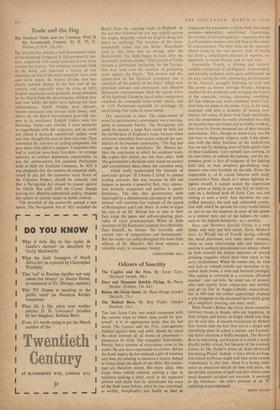Trade and the Flag
The Eastland Trade and the Common Weal in the Seventeenth Century. By R. W. K. Hinton. (C.U.P., 32s. 6d.) DR. HINTON has written a well-documented study of the Eastland Company in the seventeenth cen- tury, supported with useful statistics drawn from manuscript sources. The company exported cloth to the Baltic and imported a variety of raw materials, of which the most important were corn and naval stores. Its history divides into two clearly marked phases. In the first half of the century, and especially after the crisis of 1620,' English merchants were gradually being extruded by the Dutch from the advantageous position they had won whilst the latter were fighting for their independence. Dutch freights were cheaper, marine insurance and interest rates lower, and, above all, the Dutch Government gave full sup- port to its merchants. English traders were less fortunate. James and Charles I were normally at loggerheads with the taxpayers and so could not afford a forward commercial policy, even had they thought this part of their function. They controlled the activities of trading companies, but gave them little effective support. Companies thus had to exercise semi-State functions—to arrange convoys, to conduct diplomatic negotiations, to pay for ambassadors. On occasion Parliament tried to help the Eastland Company. In 1621 it was proposed that the customs on exported cloth, raised to pay for the expensive royal fiasco of the Cokayne Project, should be reduced; and that a Navigation Act should be passed against the Dutch. But until 1640 the Crown, though lacking any effective commercial policy, retained this sphere of activity under its feeble control.
The downfall of the monarchy opened a new epoch. The Navigation Act of 1651 excluded the
Dutch from the carrying trade to England. In the war that followed the Act was upheld against the mighty Republic which no English King had dared to challenge. The warships of the .Com- monwealth sailed into the Baltic. Henceforth (and in this there was no change after the Restoration) 'the State began to look after the merchants' welfare abroad.' The Council of Trade became a permanent institution. So 'the Naviga- tion Acts took over the function of protecting trade against the Dutch.' The decline and dis- appearance of the Eastland Company was a corollary of the growth of the State,' which now provided convoys and permanent and effective diplomatic representation. Half the raison d'etre of the Eastland Company (as of other companies) vanished. Its monopoly came under attack, and in 1673 Parliament curtailed its privileges by establishing free trade in naval stores.
The conclusion is clear. The replacement of royal by parliamentary sovereignty was a turning- point in economic history. The Navigation Act could be passed, a large fleet could be built for the furtherance of England's trade, because those who now controlled State power enjoyed the con- fidence of the business community. 'The flag had caught up with the merchants.' Dr. Hinton dis- likes the conclusion to which his evidence leads. He argues that before, no less than after, 1640 'the government's decisions were based on ancient and conventional ideas about the common weal, . . . which easily transcended the interests of particular groups.' If Charles I failed to protect trading interests, this was because he did not happen to possess a powerful fleet. Any connec- tion between economics and politics is purely fortuitous. The idea that governments were motivated by a disinterested conception of 'public interest' will convince few students of the epoch of Buckingham and Lady Mora. In order to argue his case at all Dr. Hinton has to take at their face value the pious and self-exculpating plati- tudes of royal proclamations. When he finds members of the Eastland Company less charitable than himself, he blames 'the naturally self- centred view of corporations and businessmen.' But the reader can safely disregard this naive little whimsy of Dr. Hinton's. His book remains a valuable study in economic history.
CHRISTOPHER HILL


































 Previous page
Previous page